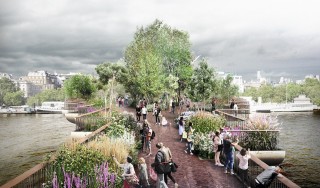Among the beneficiaries of the bridge that never was are the lead consulting engineer Arup, which banked £7.4m for services rendered.
The Bouygues Travaux Publics and Cimolai Joint Venture, which won the contract to build the bridge, was paid nearly £21.4m for mobilising, helping with planning and preparations and then demobilising. The nearest it came to building anything was some community gardening work.
More than £4.5m was spent on fundraising and promotion and press events.
Fugro got £1.3m for marine/ground investigation works.
The Garden Bridge project was always conceived as a visitor attraction rather than transport infrastructure, unlike most bridges. The vision was a privately operated footbridge full of trees and shrubs across the River Thames between Temple and South Bank. It was cancelled in 2017 after costs escalated beyond £200m. Transport for London, them under the control of London mayor Boris Johnson, and the Department for Transport had each agreed to give the project £30m. The rest was to come from public fundraising.
The Garden Bridge Trust, the project client, blamed the collapse of the scheme on subsequent London mayor Sadiq Khan’s refusal to underwrite the annual maintenance costs. This scared off potential donors, it said.
A report produced by Dame Margaret Hodge into the project, commissioned by Sadiq Khan, was the final nail in the coffin of the Garden Bridge. Published in April 2017, it concluded that it would be better to scrap the project at a cost of £46.4m to the taxpayer than to risk going ahead with it. It also confirmed that the taxpayer-funded contracts awarded to Heatherwick Studio and Arup were done so without fair and open competition.
We now know that the cost of what architect Ian Ritchie called "a wonderful exercise in celebrity hype and hubris" was even more than this. It was £53.5m, of which £43m is unrecoverable taxpayers’ money.
As financial administrator for the public sector funding, TfL has spent the last year reviewing the Trust's request for payment under the underwriting agreement, to ensure that the final cost from any part of the public purse is kept to a minimum.

The review has assessed the request in detail to ensure that any payment to a third party under the agreement is fully justified.
TfL has now concluded its review and confirmed that the final amount payable to the Trust is £5.5m. This will come from DfT funding, and include around £500,000 for future liabilities and contingency associated with the formal wind-up of the Trust in accordance with Charity Commission requirements.
It is around 40% lower than it could have been, TfL said. It also means the final public sector spend will be around £43m - split between £24m from TfL and £19m from the DfT.
TfL has received legal advice that neither it nor the DfT have any reasonable prospect of recovering any of the money.
Alex Williams, TfL director of city planning, said: “As part of our continuing commitment to transparency, we have published the final financial breakdown for the Garden Bridge project, on behalf of the Trust, as well as all evidence sought as part of this review.
“We worked to ensure that the cost to the public sector has been kept to a minimum, and having carefully reviewed the Garden Bridge Trust's request, we have now confirmed the final payment legally required under the terms of the underwriting agreement made by the government.
“This formally ends our involvement with the project.”
All documents published by TfL relating to the Garden Bridge Trust project can be found at tfl.gov.uk/corporate/publications-and-reports/temple-footbridge
Got a story? Email news@theconstructionindex.co.uk



